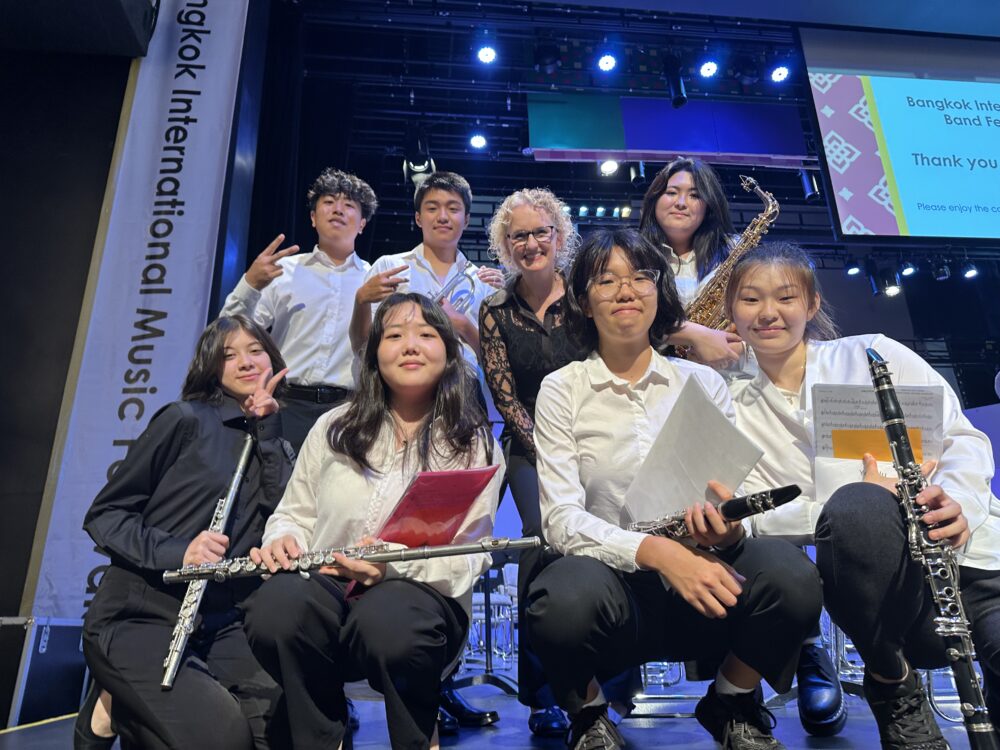
Dr. Heidi Miller has been a faculty member for a decade, conducting the Gustavus Wind Symphony, teaching courses in music education, theory, and conducting, as well as being a highly visible member of the department, conducting at the Bjorling Music festival and representing the college at numerous other festivals throughout the US and abroad. Of course, these aren’t the only things worth mentioning about her; she has gone through a significant journey to get to the place she is today.
Before jumping into her story, here are a few of her exciting upcoming performances: she will lead the Minnesota All-State Concert Band at the Minnesota Music Educators Association (MMEA) convention in February, in a performance at Orchestra Hall (Minneapolis), which is a culmination of a week of intense rehearsals over the summer and two days at the convention. She is guest conductor for a full program with the Minnesota Symphonic Winds in February, and will join internationally renowned composer Julie Giroux at Lamar University (Texas) to collaborate with an honor band in March.
Miller started her music journey early. “I can’t remember a time when I didn’t have music in my life,” she says. She began Suzuki piano at the age of four. Suzuki training teaches music like a language, and encourages learning by ear first before learning to read notation. When she began playing trumpet in junior high school, she ran into some obstacles because now she couldn’t rely on her ear as much and really needed to learn how to READ the music. “I am very stubborn, so it was tough at times,” she said.
She also had another love: science. For most of high school, she imagined pursuing the sciences in college, even spending two weeks at the U.S. Space Academy in Huntsville, AL as a sophomore. It wasn’t until late in her junior year that she changed her mind. “I really wanted to be an astronaut, but the chances of me working for NASA were very small,” she says. This was part of her reasoning for ultimately switching to a career in music. The other part of her reasoning was, “If I’m doing music, no matter what I’m doing, I think I can find a place where I can be happy.”|
This college path then led her to one of her other passions, conducting. Her college band director turned her onto conducting, a realm where she could become a “conduit for the music.” “As a conductor you get to be inside of the music and really know every aspect of it, and that is so special” she says.
Dr. Miller took 6 years to complete her undergraduate degree because she did not combine education with her music degree until her senior year, and therefore had significant coursework left to complete. She does not regret the two extra years, however. In a classic liberal arts fashion, she says they gave her time to take classes she would not otherwise have had the opportunity to take, seek out additional performance opportunities, and expand her knowledge.
She then moved into her graduate and postgraduate careers, which included teaching high school in Spring Lake Park, MN, conducting and teaching music education at Ithaca College, serving as Assistant Conductor to the Pioneer Valley Symphony Orchestra and Chorus (MA), and conducting the Williams College Wind Ensemble in Williamstown, MA. She has achieved an international reputation as a guest conductor, traveling to Thailand in September 2023 to conduct a Festival Band of 180 international students at the Bangkok International Band Festival.
Bringing diversity to the repertoire she programs is another extremely important aspect to Dr. Miller. “Our repertoire has traditionally been dominated by white male composers,” she says. “The progress that we’re making may feel slow at the moment, but if I think back to what my repertoire lists looked like when I was graduating college, I feel very good about the progress that is being made – at least at some institutions!” She also sees things in a different way because she experiences the world of conducting through the lens of womanhood. “It can be very frustrating to be labeled as a ‘female’ conductor because sometimes I feel pressured to represent all women, when in reality I am a conductor, full stop.” For instance, she has been invited to conduct at events where organizers were creating programs presenting only “women in music.” Organizers must use care, keeping open minds and ears, when contemplating such events. “In a few past such experiences, I’ve been made to feel less than … was I chosen because I was capable and qualified? Or was I chosen because I checked a convenient box? Because of how I’ve felt in those situations, I am extremely conscious in my programming of trying not to tokenize anyone.”
Such awareness of the complexities and paradoxes of music performance is what makes her stand out as a professor and mentor. “We can make a difference by playing music that matters because of the connections it has to the world around us. Yet sometimes music’s value is in the art itself, which is also important, because it teaches us about ourselves and what it means to be human.”